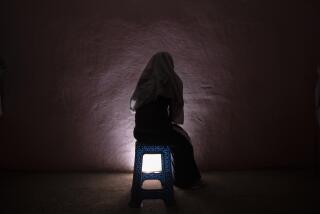Waiting for the promised land
- Share via
GONDER, ETHIOPIA — At the current rate of exodus, it will take at least two years for the last Ethiopians with Jewish roots to leave for Israel. Asmare Alemu Abate is among those waiting.
Asmare’s reasons for yearning to go are evident in Gonder, where most live. Discriminated against in largely Christian and Muslim Ethiopia, they live on the margins of society.
The Gonder synagogue, its 60 benches arrayed on a dirt floor under a roof of corrugated iron, sits next to piles of garbage and a stream of sewage. Nearby is a feeding center financed by international donors.
Ethiopia is one of the poorest countries in the world. In Gonder, about 300 miles northwest of Addis Ababa, sparsely furnished shacks are built of metal salvaged from 55-gallon drums and have no running water or toilets. Few have electricity.
When the rainy season is in full swing, everything is wet and muddy. Children in tattered clothes play near piles of trash where goats, chickens and stray dogs search for scraps of food.
“Look at how we live,” Asmare said, gesturing inside a dimly lighted, one-room house he shares with his wife and eight children.
“We sleep together in our beds and use the beds as a table for eating. I can’t afford to feed my children, send them to school, or buy a new roof for my house. I want to leave for Israel.”
About 300 Ethiopians immigrate every month to Israel. Officials agreed just over a year ago to double the monthly departures, but no action has been taken to make that a reality.
About 9,000 Ethiopians eligible to go to Israel remain, most of them in Gonder, said Ori Konforti, the Jewish Agency’s top representative in Ethiopia -- though estimates from activists in Israel range as high as 18,000.
Israel’s Law of Return says there is a place in the Jewish state for every Jew who is not a known danger and has never converted to any other religion.
In 1984 and 1991, the Falasha -- Ethiopian Jews who kept their faith through the years in the face of adversity -- were flown to Israel by the thousands.
That left the Falash Mura, the descendants of Jews who converted to Christianity to escape discrimination at the end of the 19th century but returned to Judaism. In 2003, they were given a special exemption by former Israeli Prime Minister Ariel Sharon and the top rabbis of Israel.
The pull of Israel is strong, as was evident on the faces of 75 men, women and children heading for the Jewish state recently. But many said the moment was bittersweet.
“We have waited so long and now I am so glad my family is going to Israel, but we are leaving much behind as well,” Alelign Abeneh Takele, 45, said as his wife, six children and mother-in-law sat in a bus.
The emigrants gathered inside the gate of an administrative building across from the Israeli Embassy. They came on foot and by minibus taxis, carrying their belongings on their heads and in their arms, dressed in their best clothes and accompanied by friends and family.
There were tears and long embraces as luggage was loaded on the two old buses that would take them to the airport.
“I have been alone here in Ethiopia for many years, but my brother and sister are in Israel and I cannot wait to see them,” Wuba Kefale Mengistu, 65, said as she wiped away tears. “I’ll never see Ethiopia again.”
More to Read
Sign up for Essential California
The most important California stories and recommendations in your inbox every morning.
You may occasionally receive promotional content from the Los Angeles Times.










